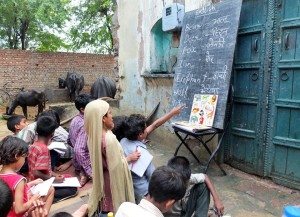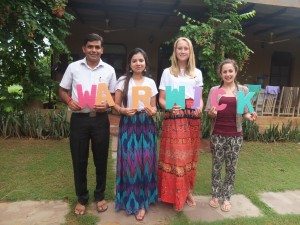Warwick Laksh nothing in volunteering opportunities
[dropcap]T[/dropcap]he air is a mix of oxygen, pollution, and the smell of freshly fried Indian treats. You hear cars honking, wild dogs barking, people shouting, customers bartering. You see a narrow street full of shops selling everything you could possibly need for an Indian wedding, and the street adjacent to it selling taps, showers, toilets. Another street sells sarees, lehengas, shoes, bags, and another sells all kinds of jewellery. Amidst the chaos of it all, there is nothing that you can’t find in Chandni Chowk. Welcome to India!
Whilst the sun was shining down on England this summer, a group of Warwick students were experiencing a different kind of heat in another part of the world during their volunteering trip to India as part of the Warwick Laksh project.
In 2010, Warwick teamed up with Laksh Foundation, a non-governmental organisation in Haryana, to develop a global volunteering project with the aim of developing education methods in a rural part of India. With only three volunteers in the first year, to 12 volunteers in its fifth year, it is safe to say the project has gone from strength to strength ever since it began.
As part of this year’s cohort, I embarked on a sponsored trip to the land of culture, diversity and Bollywood; a journey that would prove to be a big learning curve for everyone involved. Fundraising done, suitcase packed with a stash of insect repellent, and the all-important visa approved, it was time to head off to a country I’d previously only ever seen in movies like Slumdog Millionaire.
Situated in Mangar Village, a 45-minute drive from Delhi, Laksh farm is nothing short of a haven for all those who live and work there.
To go to heaven you need not die; just come to Laksh
says Shakti Lumba, one of the founders of Laksh Foundation. The farm is a unique cooperative which practises eco-friendly methods of farming, empowers women in the community by providing them with alternative employment in the form of textile and garment work, and has a school which trains student teachers, who then teach at the five different tuition centres the foundation has set up across the village.
I volunteered at the Laksh School with three other Warwick students, and during the month-long project we helped to implement teacher training and introduce the Laksh teachers to contemporary teaching methods. The Laksh School staff is comprised of local village students who have studied up to at least class ten, and who were previously very used to teaching by rote. Our task was to show the teachers the benefits of interactive methods of teaching so that they could incorporate fun ways of learning into their lesson plans. As expected, the results didn’t disappoint. Introducing creativity in the form of drawing, painting and singing in the classroom made a world of difference to the learning of the 300+ children who attend Laksh tuition centres on a regular basis.
I will refrain from making clichéd claims, but one thing is for certain – we visited India as foreigners, and we now have family in the form of all those who are a part of Laksh
But you can’t fully appreciate the holistic oasis that is Laksh until you visit a place that is in complete contrast to it. During our stay in India, we got the chance to do lots of sightseeing on the weekends: Taj Mahal in Agra, Hawa Mahal in Jaipur, Qutab Minar in New Delhi and Chandni Chowk in Old Delhi are just a few of the places that we visited. What an authentic experience it was every time! These weekend trips were a great chance for us to get to know India better and to be acquainted with its vibrant culture. The traffic that had shocked us on the day we arrived soon became a welcomed part of our weekend routine. The Rickshaws carrying a family of eight no longer looked dangerous, and we gradually became immune to the non-stop excess usage of the car horn; it was all a part of the “Indian system”, as Ramesh, one of the Laksh teachers, liked to call it.
At the same time, coming back to Laksh farm after a weekend trip couldn’t have been more exciting, because visiting the “real” India made us ever more grateful for the work done at Laksh, including the comfort, security and sense of peace and tranquility it provides to all the people who live and work within its four walls.
During our time volunteering, we also got to know the teachers personally and concentrated on their personal development by organising sessions on career counselling, interview skills, and CV writing. It was great to hear the wonderful things the teachers hope to do in the future. Ramesh wants to pursue a career in tourism and later wants to open up a school for underprivileged children; Jamalu wants to be a teacher or a doctor; Sheela wants to work for a corporate company. Our careers-related sessions encouraged the teachers to think of ways to reach their future goals.
It would be no exaggeration to say that our time in India flew by. On the last day of our trip, Ash, a fellow Warwick volunteer, embedded the month-long memories on her body forever by getting a tattoo of a mandala, which symbolises the universe in Hinduism. Many people use the phrase “life-changing” loosely, and many people will tell you they visited a country and they’d definitely recommend it. I will refrain from making clichéd claims but one thing is for certain – we visited India as foreigners, and we now have family in the form of all those who are a part of Laksh.



Comments